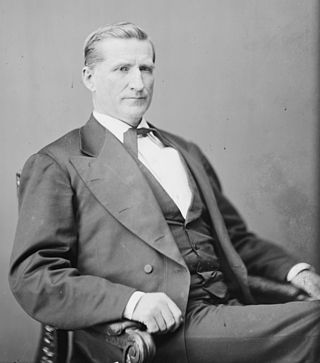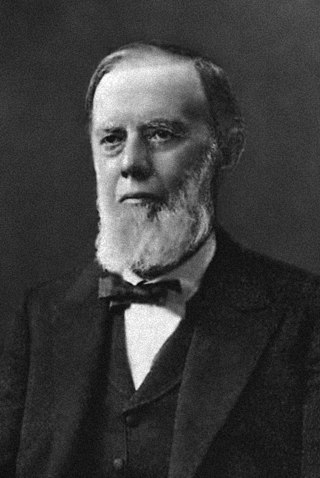
The Georgia General Assembly is the state legislature of the U.S. state of Georgia. It is bicameral, consisting of the Senate and the House of Representatives.

Jacob Collamer was an American politician from Vermont. He served in the U.S. House of Representatives, as Postmaster General in the cabinet of President Zachary Taylor, and as a U.S. Senator.

Ninian Edwards was a founding political figure of the State of Illinois. He served as the first and only governor of the Illinois Territory from 1809 to until the territory was dissolved in 1818. He was then one of the first two United States senators from the State of Illinois from 1818 to 1824, and the third Governor of Illinois from 1826 to 1830. In a time and place where personal coalitions were more influential than parties, Edwards led one of the two main factions in frontier Illinois politics.

Henry Stanbery was an American lawyer from Ohio. He was most notable for his service as Ohio's first attorney general from 1846 to 1851 and the United States Attorney General from 1866 to 1868.

William Wyatt Bibb was a United States Senator from Georgia, the first governor of the Alabama Territory, and the first Governor of the U.S. state of Alabama.

Carl Edward Sanders Sr. was an American attorney and politician who served as the 74th Governor of the state of Georgia from 1963 to 1967.

Augustus Emmet Maxwell was an American lawyer and politician. Maxwell served in a number of political positions in the State of Florida including as one of Florida's Senators to the Confederate States Congress, Florida Secretary of State, and as Chief Justice of the Florida Supreme Court.

Evan Park Howell was an American politician and early telegraph operator, as well as an officer in the Confederate Army during the American Civil War.

Alfred Holt Colquitt was an American lawyer, preacher, soldier, and politician. Elected as the 49th Governor of Georgia (1877–1882), he was one of numerous Democrats elected to office as white conservatives took back power in the state at the end of the Reconstruction era. He was elected by the Georgia state legislature to two terms as U.S. Senator, serving from 1883 to 1894 and dying in office. He had served as a United States officer in the Mexican-American War and in the Confederate States Army during the American Civil War, reaching the rank of brigadier general.

John Goode Jr. was a Virginia attorney and Democratic politician. He served in both the United States Congress and the Confederate Congress, and was a colonel in the Confederate Army. He was Solicitor General of the United States during the presidency of Grover Cleveland. He was known as "the grand old man of Virginia."

The Georgia Republican Party is the affiliate of the Republican Party in the U.S. state of Georgia and one of the two major political parties in the state and is currently chaired by David Shafer.

The lieutenant governor of Georgia is a constitutional officer of the State of Georgia, elected to a four-year term by popular vote. Unlike in some other U.S. states, the lieutenant governor is elected on a separate ticket from the Governor of Georgia.

The 2010 Vermont gubernatorial general election took place on November 2. Vermont and New Hampshire are the only two states where the governor serves a two-year term instead of four. Primary elections took place on August 24.

Elections in Alabama are authorized under the Alabama State Constitution, which establishes elections for the state level officers, cabinet, and legislature, and the election of county-level officers, including members of school boards.

Edwin Maxwell was an American lawyer, judge, and politician in the U.S. state of West Virginia. Maxwell served as Attorney General of West Virginia in 1866 and was an associate justice of the Supreme Court of Appeals of West Virginia from 1867 until 1872. He was elected to the West Virginia Senate and the West Virginia House of Delegates.

The 1972 United States Senate election in Georgia took place on November 7, 1972, as one of that year's United States Senate elections. It was held concurrently with the 1972 presidential election. This seat had opened up following the death of Richard B. Russell in 1971. Shortly thereafter, Governor of Georgia Jimmy Carter appointed David H. Gambrell to fill Russell's vacant seat. The Democratic Party nominee was Sam Nunn, a conservative Democrat and member of the Georgia House of Representatives, and the Republican Party nominated Fletcher Thompson, the Representative from the Atlanta-area 5th congressional district of Georgia. In the primary, Nunn emerged victorious from a crowded field of Democratic candidates, including Gambrell and former Georgia Governor Ernest Vandiver. Despite President Richard Nixon defeating George McGovern in Georgia in the presidential election on the same day, Nunn defeated Thompson in the general election 54% to 46%.
The "Original 33" were the first 33 African-American members of the Georgia General Assembly. They were elected to office in 1868, during the Reconstruction era. They were among the first African-American state legislators in the United States. Twenty-four of the members were ministers. Upon taking office, white Democrats, then a minority in the Assembly, conspired with enough white Republicans to expel the African-American legislators from the Assembly in September 1868. The next year, the Supreme Court of Georgia ruled that African Americans had the right to hold office in Georgia. The expelled legislators were reinstated and took office in January 1870.

Women's suffrage in Georgia received a slow start, with the first women's suffrage group, the Georgia Woman Suffrage Association (GWSA) formed in 1892 by Helen Augusta Howard. Over time, the group, which focused on "taxation without representation" grew and earned the support of both men and women. Howard convinced the National American Women's Suffrage Association (NAWSA) to hold their first convention outside of Washington, D. C. in 1895. The convention, held in Atlanta, was the first large women's rights gathering in the Southern United States. GWSA continued to hold conventions and raise awareness over the next years. Suffragists in Georgia agitated for suffrage amendments, for political parties to support white women's suffrage and for municipal suffrage. In the 1910s, more organizations were formed in Georgia and the number of suffragists grew. In addition, the Georgia Association Opposed to Woman Suffrage also formed an organized anti-suffrage campaign. Suffragists participated in parades, supported bills in the legislature and helped in the war effort during World War I. In 1917 and 1919, women earned the right to vote in primary elections in Waycross, Georgia and in Atlanta respectively. In 1919, after the Nineteenth Amendment went out to the states for ratification, Georgia became the first state to reject the amendment. When the Nineteenth Amendment became the law of the land, women still had to wait to vote because of rules regarding voter registration. White Georgia women would vote statewide in 1922. Native American women and African-American women had to wait longer to vote. Black women were actively excluded from the women's suffrage movement in the state and had their own organizations. Despite their work to vote, Black women faced discrimination at the polls in many different forms. Georgia finally ratified the Nineteenth Amendment on February 20, 1970.
George Parmlee Webster was an American lawyer and politician.
















